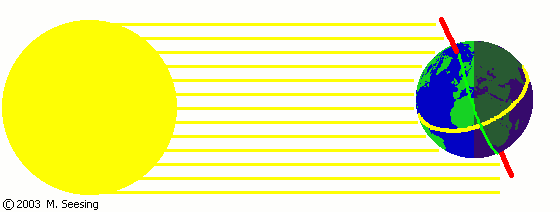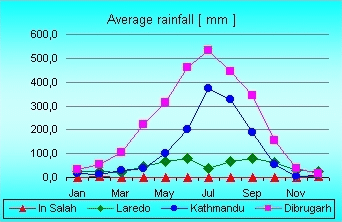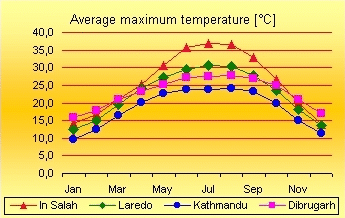|
|
 |
 |
 |
|
1. The angle of solar radiation
|
|
We all know that the Polar regions and the Equatorial regions have very different climates. This is because the two regions receive very different amounts of solar radiation. However, along the same degree of latitude the intensity of the solar radiation is similar.
If you travel along the 27 °N degree of latitude, for example, you will pass through the towns of: Dibrugarh, Kathmandu, Laredo and In Salah.
|
T1 |
Complete the table by using the internet or an atlas. |
| |
name of the city |
country |
degree of longitude |
height above sea level |
| |
In Salah |
|
|
|
| |
Laredo |
|
|
|
| |
Kathmandu |
|
|
|
| |
Dibrugarh |
|
|
|
|
The graphs below show the average rainfall and the average maximum temperature in these places. |
Briefly compare the climates of Laredo and Dibruarh. At what times of year are the climates similar, when are they very different?
|
 |
 |
 |
|
2. © 2003 Seesing, Tausch Universität-Duisburg-Essen
Source of data: WorldClimate (www.worldclimate.com)
|
|
Is height above sea level the only factor responsible for the differences we see? Have a look at the data for In Salah and Kathmandu as well.
|
 |
 |
 |
|
3. © 2003 Seesing, Tausch; Universität-Duisburg-Essen
Source of data: WorldClimate (www.worldclimate.com)
|
|
|
Which of these factors influence the local climate?
|
o large power stations |
o height above sea level |
o crying babies |
|
o plant vegetation |
o colour of the sky |
o animals |
|
o religion of the citizens |
o degree of latitude |
o time of day |
|
o main wind direction |
o satellites |
o motor traffic |
|
o human land development
(houses, agriculture) |
o surface structure (mountains,
valleys, plains) |
o distance from the sea |
|
About this page:
authors: M. Seesing, M. Tausch - Universität Duisburg-Essen, Duisburg, Germany
last update: 2004-05-13
|
|
 |
|







